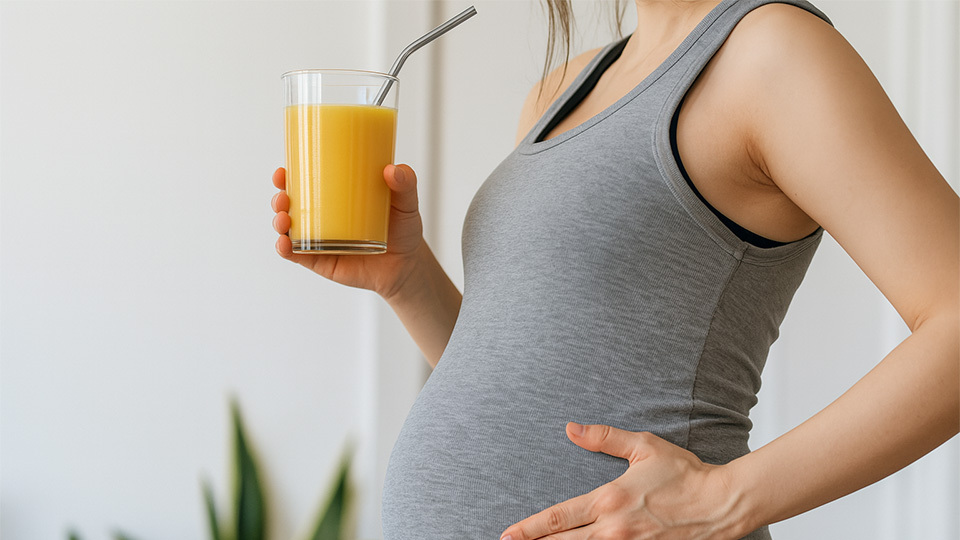Pregnancy is a beautiful journey that brings with it a heightened focus on nutrition, health, and wellbeing. Juicing, when done right, can be a fantastic way to boost your nutrient intake, hydrate your body, and support both your wellbeing and your baby’s development.
But what’s safe to juice during pregnancy? Are there fruits or veggies you should avoid? In this post, we’ll explore how juicing fits into a pregnancy-safe diet, what nutrients to prioritise, and how to make it both delicious and beneficial.
Juicing During Pregnancy: What’s Safe and What’s Not

Why Juicing Can Be Great During Pregnancy
Freshly made juices are packed with vitamins, minerals, and antioxidants, all of which are crucial during pregnancy. Here’s why juicing can be a smart addition to your prenatal diet:
1. Easier Nutrient Absorption
Juices remove most of the fibre, making the vitamins and minerals more bioavailable, especially helpful if morning sickness or food aversions make solid meals difficult.
2. Hydration Support
Staying hydrated is critical during pregnancy. Juices (especially cucumber, watermelon, or citrus-based) can help meet your daily fluid needs in a tastier way than plain water.
3. Supports Digestive Health
Many pregnancy-friendly juices include ingredients like ginger or pear, which naturally support digestion and ease constipation, a common pregnancy symptom.
Key Nutrients to Prioritise in Your Juices
When juicing during pregnancy, it’s especially important to focus on ingredients rich in these essential nutrients:
- Folate (Folic Acid): Helps prevent neural tube defects in the baby. Look to ingredients like spinach, beetroot, and oranges.
- Vitamin C: Supports immune health and helps your body absorb iron. Citrus fruits like oranges and grapefruits, as well as strawberries and bell peppers, are excellent sources.
- Iron: Essential for the increased blood volume during pregnancy. Spinach, beetroot, and parsley are great iron-rich additions.
- Calcium: Important for developing your baby’s bones and teeth. Add kale, broccoli, or even fortified plant-based milks (if using smoothies).
- Magnesium: Helps reduce muscle cramps and supports healthy blood sugar levels. Avocado (in smoothies) and leafy greens are ideal.
- Potassium: Helps manage blood pressure and muscle function, preventing leg cramps. Bananas (smoothie), oranges, and coconut water are easy options.
Safe Juicing Ingredients During Pregnancy
Here are some pregnancy-safe fruits and vegetables that are great for daily juicing:
Vegetables
- Carrots – High in beta-carotene (Vitamin A precursor)
- Beetroot – Rich in iron and antioxidants
- Spinach – Great source of folate and iron
- Cucumber – Excellent for hydration
- Celery – Helps reduce water retention.
Fruits
- Apples – Gentle on the stomach and high in Vitamin C
- Berries – Antioxidant-rich and low in sugar
- Citrus fruits (oranges, grapefruit) – Vitamin C powerhouse
- Pears – Aid digestion
- Mango – High in Vitamin A and E
Juicing Tip: Always wash fruits and vegetables thoroughly, even if they’re organic, to avoid bacteria and pesticide residues.
Juicing Ingredients to Avoid During Pregnancy
Not every healthy ingredient is pregnancy-safe. Here’s what to avoid or limit:
- Unpasteurised Juice (e.g. from cafés or street vendors) – May contain harmful bacteria like Listeria or E. coli. Always juice fresh at home.
- Papaya (unripe) – Contains latex, which may trigger uterine contractions.
- Pineapple (in excess) – Bromelain in high quantities may soften the cervix.
- Aloe Vera Juice – Can stimulate the uterus and cause electrolyte imbalance.
- Wheatgrass – May contain mould or bacteria if not properly handled.
- Large quantities of parsley or ginger – Safe in small amounts, but high doses can act as stimulants.
3 Simple & Safe Juice Recipes for Expecting Mums
1. Iron-Boost Green Juice
- 1 handful spinach
- ½ cucumber
- 1 green apple
- Juice of ½ lemon
- ½ inch ginger (optional)
2. Citrus Immunity Booster
- 2 oranges
- 1 grapefruit
- ½ cup strawberries
- ½ carrot
3. Digestive Soother
- 1 ripe pear
- ½ banana (blended for texture)
- 1 cup coconut water
- Pinch of cinnamon
Final Tips Before Juicing During Pregnancy
- Speak with your midwife or GP, particularly if you have gestational diabetes or any pregnancy complications. Some juices may raise your blood sugar quickly.
- Don’t replace meals with juices. Juicing should complement a balanced, whole-food diet.
- Moderation is key: One to two juices per day is enough; juices still contain natural sugars.
Looking for a Pregnancy-Safe Juicer?
A slow (masticating) juicer is ideal during pregnancy. It gently presses ingredients to preserve nutrients and works well with leafy greens like spinach and kale, perfect for iron- and folate-rich juices.
Nourish Yourself & Your Baby, Naturally
Juicing during pregnancy can be a nutrient-packed, hydrating, and enjoyable part of your wellness routine. With the right ingredients and safety tips, you’ll be giving your body and baby a natural boost every time you juice.
Clean Air for a Healthier Pregnancy
Beyond nutrition, it’s also important to consider the air you breathe during pregnancy. Clean, purified air can help reduce exposure to allergens, dust, and pollutants that may affect both mum and baby. Choosing the best air purifier for pregnancy ensures a healthier indoor environment, giving peace of mind while supporting your family’s well-being. Explore air purifiers here ➝
